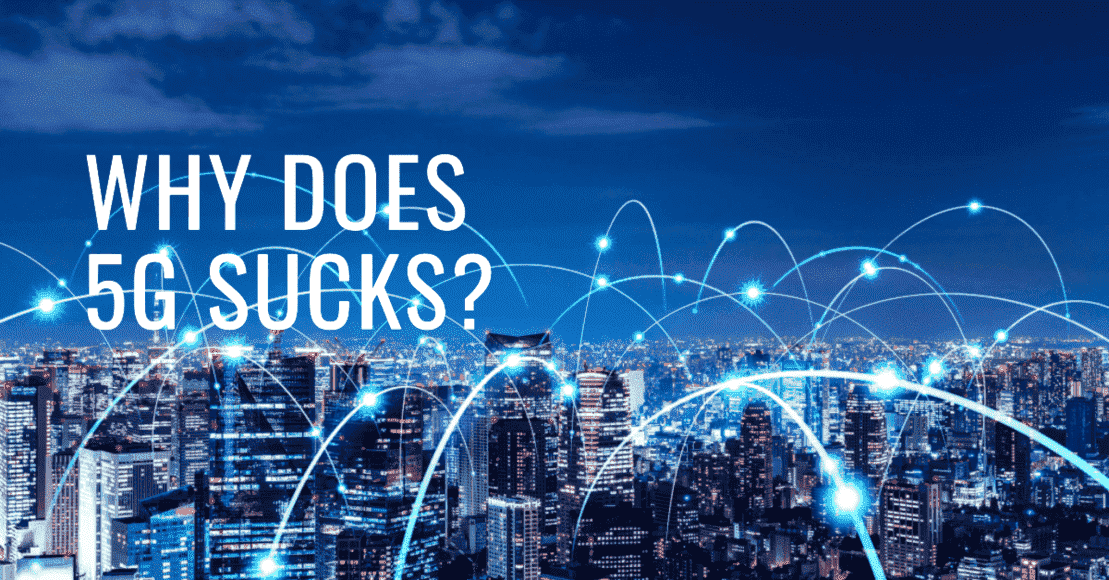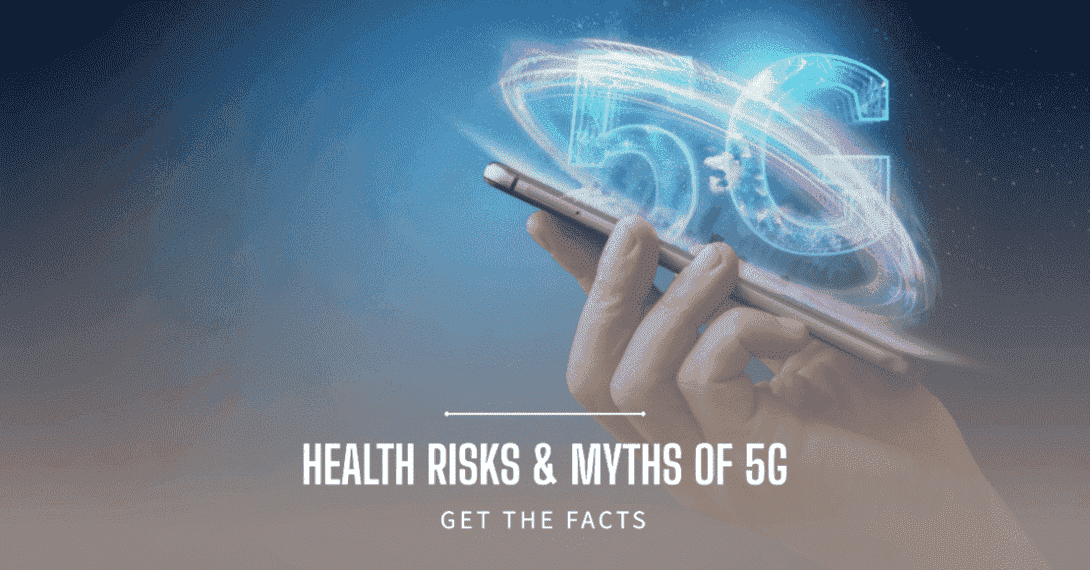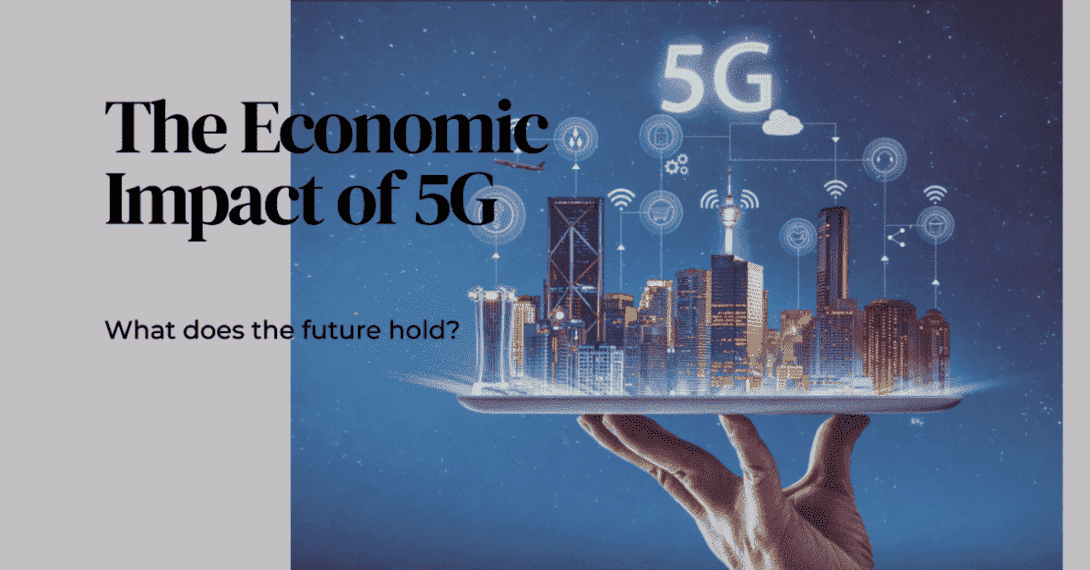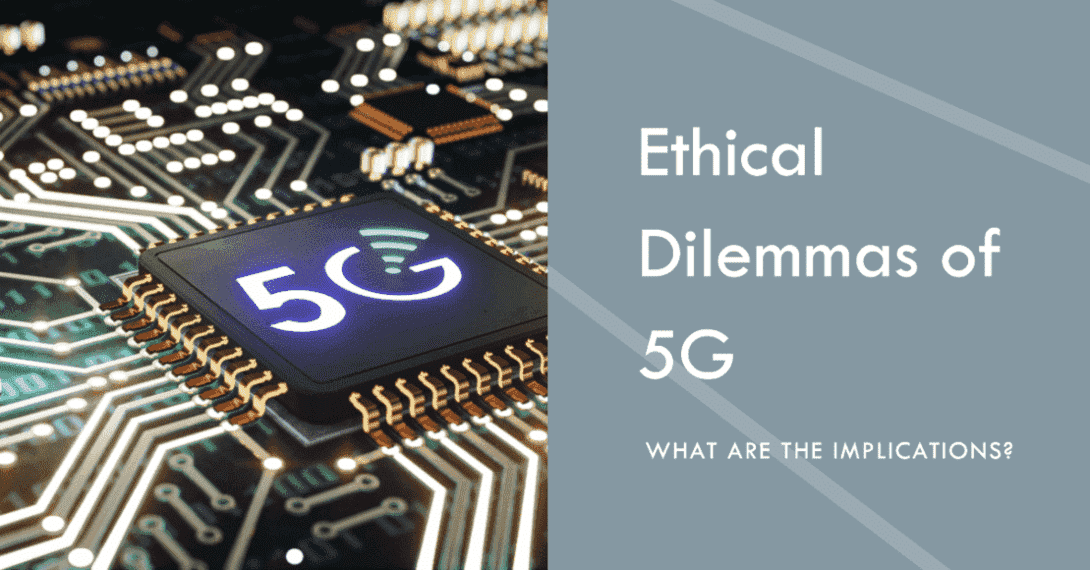Why Does 5G Sucks? Are you interested in the dark side of 5G technology and why it may not be as fantastic as it has been marketed to be? Look no further than this informative article on “Why does 5G suck” and what you need to know about this new telecommunications standard.

NextGen 5G
Fifth-generation (5G) wireless technology, also known as NextGen 5G, is the newest mobile telecommunications standard. It brilliantly outperforms its predecessor, 4G (Fourth-generation), in terms of download & upload speeds, reduced latency, & increased network capacity. NextGen 5G networks offer wider coverage & faster speeds, revolutionizing communication, & internet connectivity by combining high-frequency millimeter waves with lower-frequency bands.
Advanced applications like virtual reality (Metaverse), the Internet of Things (IoT), & autonomous vehicles are all within reach thanks to Next Gen 5G. With Next Gen 5G, get ready to experience wireless technology at its highest level!
Hype Surrounding 5G
Get ready to upgrade your phone plan & your life because 5G is here to blast us off into the future! It’s so fast that you’ll be able to download an entire movie in seconds – no more buffering circle of doom! And with ultra-low latency, your devices will communicate faster than ever before – even your spouse might listen to you on the first try! With 5G,
we’ll be able to do cool new things like remote surgery & holographic communication. But let’s not forget, 5G is still in its infancy, so you might still be stuck with 4G for a while. But who cares about that when we can finally stream cat videos in ultra-high definition? That’s the real reason we’re upgrading, right?
Shortcomings of 5G
5G has a shorter range & has difficulty penetrating walls, 5G is like that friend who always needs to be close to you. Also, there are concerns about 5G network security, and its increased energy consumption may contribute to climate change. While 5G has a lot of promise, we don’t want to be stuck with a fancy new technology that can’t even penetrate a cardboard box?
Inconsistency in Speed
5G is supposed to be super fast, but the problem is that it’s not always consistent. You could be downloading a movie at lightning speed one minute and then stuck waiting forever the next. And to make things worse, the speed is highly dependent on factors like distance from the tower and the number of devices connected to it. So, if you’re in a crowded area with lots of people trying to use 5G at the same time, you might find yourself stuck in the slow lane. But hey, maybe that’s just part of the excitement of living in the 5G world – like a high-speed rollercoaster ride, it’s bumpy and sometimes slow, but still thrilling.
Limited Coverage
5G has limited coverage which can be frustrating for users. While it offers lightning-fast speeds in certain areas, once you step outside of the coverage zone, you’re out of luck. 5G coverage is still quite limited, meaning that those in rural or less populated areas may be stuck with older technologies. In today’s highly connected world, widespread coverage is increasingly necessary, so 5G needs to expand its coverage to keep up with demand.
High Infrastructure Costs
The significant infrastructure expenses of establishing 5G (Fifth-generation) networks, as well as continuous maintenance, are important & critical issues. To compensate for these expenses, consumers may wind up paying greater fees for 5G services, making them unaffordable for the average individual. While 5G promises lightning-fast speeds, its expensive cost may prevent it from reaching a larger audience.
Limited Device Compatibility
The problem of restricted device compatibility has been observed throughout the 5G deployment. Older gadgets may be incompatible with the new technology, & even newer devices may not function with all carrier’s 5G networks. This might be aggravating for users who may have to upgrade their gadgets more regularly in order to take advantage of the most recent technologies. Some may see this as an opportunity to upgrade to newer devices, albeit at a cost.
Health Risks & Myths of 5G
Some people are concerned about the health risks of 5G radiation, most experts believe it’s not a significant threat. It’s possible to take simple precautions to reduce exposure if you’re worried, but there’s no need to be overly concerned. The benefits of 5G technology, such as faster internet speeds & increased connectivity, far outweigh any potential risks.

Electromagnetic Radiation
The Radio Frequency (RF) waves used in 5G technology are non-ionizing & do not have enough energy to damage DNA or cause cancer. The RF waves used in 5G are similar to those used in 4G & earlier wireless technologies & have been extensively studied for many years without any conclusive evidence of harm. Scientific & health organizations around the world consider 5G technology safe.
5G Network and Cancer
There is no proper scientific evidence to imply a link between 5G (Fifth-generation) technology exposure & cancer. Non-ionizing radiofrequency waves are employed in 5G technology, which means they do not have enough energy to harm DNA or cause cancer. Numerous scientific & health organizations have conducted extensive research on the subject & found no evidence of adverse health effects from 5G electromagnetic radiation exposure. Despite significant public concern, there is no evidence to back assertions that 5G technology raises cancer risk.
5G Network and Covid-19
There is no scientific evidence to back up the notion that 5G (Fifth-generation) technology is associated with the COVID-19 epidemic. When an infected individual coughs, sneezes, or speaks, the virus spreads by respiratory droplets created by a coronavirus. While some conspiracy theories have linked 5G to Covid-19, these claims lack scientific support & have been widely debunked by experts in the field.
The Precautionary Principle
According to the precautionary principle for 5G (Fifth-generation), precautions should be taken to reduce any potential risk. This suggests that safety measures should be taken to avoid electromagnetic radiation exposure, such as locating 5G (Fifth-generation) towers far from homes & schools and conducting ongoing research to determine how the technology will affect people’s health. The use of 5G (Fifth-generation) technology does not, however, pose a serious threat to human health, according to the available scientific evidence.
Economic Impact of 5G
While there may be some concerns about the economic impact of 5G (Fifth- generation) technology, such as very high infrastructure costs & potential job displacement in certain industries, there are also potential positive economic impacts, such as increased productivity in mobile sector, new job opportunities in the technology sector, & improved connectivity leading to innovation & growth in a variety of industries. To make educated judgments& build suitable regulations, it is critical to examine both the possible positive& negative economic implications of any technology.

Job Losses
Job losses are a potential negative impact of the 5G (Fifth-generation) technology, particularly in the telecommunications sector where automation & digitization could lead to a decrease in the demand for manual labor. However, some technical experts argue that 5G (Fifth-generation) could also create new job opportunities in areas such as research, development, & maintenance of 5G (Fifth-generation) networks & infrastructure. The exact economic impact of 5G (Fifth-generation) on job losses or gains remains uncertain and will depend on various factors such as industry-specific characteristics & government policies.
High Cost of Implementation
Telecoms face substantial costs with 5G, covering tower construction, equipment upgrades, licenses. This could lead to pricier 5G services & delays.
Limited Return on Investment
“Limited Return on Investment in 5G” describes telecom companies’ challenges in recovering extensive 5G infrastructure costs due to potential low initial demand, delaying expected returns and impacting future 5G investments. Thus, thorough ROI evaluation is crucial before committing to 5G infrastructure investments.
The 5G Divide
The 5G (fifth-generation) divide signifies the uneven availability of 5G tech, potentially creating a digital gap. It results in certain areas enjoying quick internet & better connectivity, while others lag before due to factors like structure costs, position, & socioeconomic status.
Political Landscape of 5G
The world of 5G (Fifth-generation) is a highly political one, with countries competing to be at the forefront of technology. However, security concerns have arisen, leading to the banning of Chinese 5G equipment in some countries due to fears of government control & espionage. Despite this, 5G connections are predicted to more than triple in the next two years, with more than 30 nations alone building new networks in 2023. The growth of 5G will also come from emerging markets such as Brazil & India.
There were currently 229 commercial 5G networks and over 700 5G smartphone models available globally as of January 2023. The enterprise market will be the primary source of 5G revenue growth in the coming decade, with the potential for edge computing & IoT technology to present even more opportunities. 5G Advanced will be commercially available in 2025, offering improvements in speed, coverage, mobility, & power efficiency to support a new wave of business opportunities.
The 5G Race between the US and China
The US views 5G (Fifth-generation) as vital for national security, economic growth, & innovation, yet lags due to slow adoption. China aggressively invests in 5G (Fifth-generation), triggering US concerns about network security & economic competition. Despite US efforts to restrict China, it remains a major 5G (Fifth-generation) player.
The 5G and National Security
The deployment of 5G (Fifth-generation) networks raises national security concerns, particularly about Huawei, a leading 5G (Fifth-generation) equipment vendor. Concerned about Huawei’s ties to the Chinese government, the USA (United States of America) has limited its market access & pressured allies to do the same. However, other countries are hesitant, citing cost & feasibility issues with alternatives. The argument revolves around concerns about potential & critical cyber dangers & espionage if Huawei (a Chinese govt controlled company) receives access to crucial infrastructure. Proponents of Huawei’s innocence stress competitiveness & innovation. The worldwide conversation on 5G (Fifth-generation) & national security is set to continue.
Ethical Dilemmas of 5G
With the greater connection provided by 5G, there are worries regarding the acquisition and use of personal data, as well as network security against cyberattacks. Furthermore, the rapid deployment of 5G (Fifth-generation) infrastructure raises environmental concerns, such as the potential health effects of radiofrequency radiation exposure.

The geopolitical implications of 5G (Fifth-generation) technology are another cause for concern, especially given China’s position & the prospect of espionage. As we continue to reap the benefits of 5G (Fifth-generation), we must strike a balance between these ethical concerns & the technological advantages.
Privacy and Security Concerns
Experts, politicians, & the general public are concerned about the introduction of 5G (Fifth-generation) technology. Because 5G networks are faster & more connected, more gadgets will be connected to the internet, offering additional entry points for attackers. Concerns have been expressed about telecom firm’s acquisition & use of personal data, as well as potential government spying.
The Threat to Democracy
The possibility for authoritarian regimes to employ 5G-enabled surveillance to monitor & control their population, as well as to stifle dissent & resistance, is one problem. Another source of worry is the possibility of foreign meddling in democratic elections since 5G (Fifth-generation) networks might serve as a platform for cyber assaults & misinformation efforts. Furthermore, the increasing reliance on 5G technology may result in a concentration of power among a few tech titans, potentially limiting competition & democratic discourse.
The Effect on Human Interaction
The adoption of 5G (Fifth-generation) networks offers opportunities for enhanced communication & efficiency in remote work & telemedicine. However, concerns about increased technology reliance leading to social isolation, weakened human relationships, & privacy issues require careful evaluation & mitigation efforts to ensure its positive impact on human interaction.
Alternatives of 5G
Wi-Fi 6
Wi-Fi 6 is the most recent generation of Wi-Fi technology, aiming to provide faster speeds & greater performance than earlier versions. While it is not a direct replacement for 5G, it may offer an alternative in some cases.
Li-Fi
Li-Fi is a wireless technology that uses light rather than radio frequencies to deliver data. It’s still in its immaturity & has considerable limitations, but it has the implicit to be a more secure & effective selection to 5G (Fifth-generation).
Satellite Internet
Companies such as SpaceX & OneWeb are developing satellite networks that might bring high-speed internet connection to rural locations. While this technology is still relatively expensive & has some limitations, it has the potential to provide an alternative to traditional wired or wireless networks.
4G LTE
While 4G LTE is not as fast as 5G, it still provides relatively fast speeds & decent performance for a wide range of applications. It may remain a viable option for 5G for some time to come, particularly in locations where 5G networks are not yet accessible.
Why does 5G sucks? Final Thoughts
Although 5G (Fifth-generation) promises faster internet, lower latency, & more connected devices, some are concerned about how it will affect privacy, security, democracy, & the digital divide. There are also critical health worries concerning 5G radiation, even though most scientists believe it is very safe. Despite these reservations, 5G (Fifth-generation) has the potential to transform industries while also making our lives more easier & even more connected. Individuals must ultimately consider the advantages and drawbacks to determine whether 5G is good for them.
FAQ’s
-
Is it ok to get a non 5g phone in 2023?
Yes, it is perfectly fine to use a non-5G phone in 2023. While 5G networks are becoming more widespread, it will still take some time for them to be available everywhere. Additionally, not all phone models are 5G-compatible, so there may not be a significant difference in network performance if you have a non-5G phone. It only depends on your specific needs & preferences. If you are happy with your current phone and don’t require 5G speeds, there’s no need to upgrade.
-
What is the biggest difference between 4g and 5g technology?
5G technology is a major improvement over 4G technology, with the primary differences being speed & latency. 5G networks can give download rates of up to 20 Gbps, which is 20 times faster than 4G, and data can flow from one place to another considerably faster due to substantially lower latency. Another key distinction is that 5G can manage many more connected devices than 4G, which is critical as the number of connected devices grows.
However, because it uses different parts of the wireless spectrum to provide higher speeds and lower latency, 5G requires more infrastructure and investment to build and maintain than 4G. -
What can i use to block 5g radiation in my house?
There presently exists no scientific proof that 5G radiation is damaging to human health, thus blocking it may not be essential. If you’re concerned about your exposure to radiofrequency radiation from many sources, including 5G, there are actions you can do to lower your risk. Among options include using your gadgets less frequently or keeping them farther away from your body, utilizing shielding goods such as EMF-blocking paint, cloth, or window film, and using connected connections rather than wireless ones.
It is important to remember that blocking 5G radiation may not be required or effective, and you should always contact with an expert before making any health and safety decisions. -
What is millimeter wave in 5g technology?
Millimeter wave (mmWave) is a high-frequency band that is utilized in 5G technology to enable quicker data transport. These waves run at frequencies ranging from 30 GHz to 300 GHz, which is far higher than prior cellular networks. Even though millimeter waves may transport more data at quicker rates, they have a limited range and are readily obstructed by barriers such as buildings and trees.
-
Will 5g affect the speed of 4g?
No, the deployment of 5G should not affect the speed of 4G networks. In some cases, 5G (Fifth-generation) may use existing 4G (Fourth-generation) infrastructure to provide coverage, which could lead to increased congestion & slower speeds on 4G networks in those areas. The overall impact on 4G speeds is expected to be minimal.

